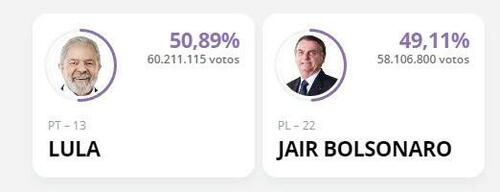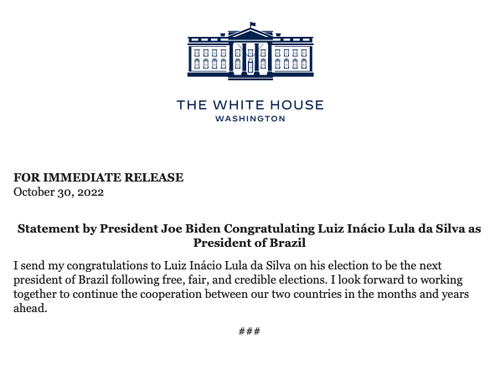
By an extremely narrow margin of less than two percentage points, Luiz Inácio Lula da Silva (Lula) has beaten incumbent Jair Bolsanaro to become Brazil's next president.
The tight result tops off a dramatic comeback for the 77 year-old opposition leader, who served two terms as president between 2003 and 2010 but subsequently was accused of corruption and served time in prison for graft before his convictions were annulled.
This result is historic as it marks the first time a sitting president in Brazil has lost a re-election bid.
Echoing the Biden administration's narratives, Lula focused on the risks to democracy from Bolsonaro’s far-right movement, framing the election as a choice between “democracy and fascism, democracy and barbarism.”
Additionally, the far-left leader pledged to reduce inequality and protect the environment while preserving the country's fiscal health (but caused consternation among some by offering few details on his broader economic agenda and refusing to nominate a finance minister).
“Lula’s challenge of governing is bigger than that of winning the election. Brazilian society needs to be rebuilt in its institutional and fiscal basis,” said Carolina Botelho, a political scientist with the Institute of Advanced Studies at Sao Paulo University.
“Lula will need to recover the internal and external trust of financial agents and civil society.”
Amid extremely high interest rates and inflation, his plan to move away from the free market vision of the Bolsonaro administration to a model that puts the state at the heart of the economy will be a key focus for investors globally.
Crucially, as The FT reports, Lula remains a deeply polarising figure and is also likely to face obstacles in Congress, which is broadly right-leaning.
Lula’s bench of leftwing allies will occupy less than about a quarter of seats in the lower house, meaning he will need to make concessions to pursue his agenda.
Bolsonaro allies will also occupy key governorships, including São Paulo - Brazil’s wealthiest and most populous state - which was won on Sunday by Tarcísio de Freitas of the rightwing Republican party.
Finally, it took just minutes for President Biden to send his congratulations to the Workers' Party leader on his success in "free, fair, and credible elections." We wonder if the US president would have been so fast to congratulate Bolsonaro if the vote count was so close but the other way? (In the run-up to the election, Bolsonaro had persistently claimed Brazil’s electronic ballot machines were vulnerable to fraud, leading opponents to fear he was preparing a justification to reject a losing result.)
Lula’s victory continues a trend of wins by left-wing candidates in Latin America over the past 18 months, most prominently in Chile, Colombia and Peru, as voters punished incumbents that were in charge during the Covid-19 outbreak.
Good luck to those holding Reals when FX starts trading tomorrow...
By an extremely narrow margin of less than two percentage points, Luiz Inácio Lula da Silva (Lula) has beaten incumbent Jair Bolsanaro to become Brazil’s next president.
The tight result tops off a dramatic comeback for the 77 year-old opposition leader, who served two terms as president between 2003 and 2010 but subsequently was accused of corruption and served time in prison for graft before his convictions were annulled.
This result is historic as it marks the first time a sitting president in Brazil has lost a re-election bid.
Echoing the Biden administration’s narratives, Lula focused on the risks to democracy from Bolsonaro’s far-right movement, framing the election as a choice between “democracy and fascism, democracy and barbarism.”
Additionally, the far-left leader pledged to reduce inequality and protect the environment while preserving the country’s fiscal health (but caused consternation among some by offering few details on his broader economic agenda and refusing to nominate a finance minister).
“Lula’s challenge of governing is bigger than that of winning the election. Brazilian society needs to be rebuilt in its institutional and fiscal basis,” said Carolina Botelho, a political scientist with the Institute of Advanced Studies at Sao Paulo University.
“Lula will need to recover the internal and external trust of financial agents and civil society.”
Amid extremely high interest rates and inflation, his plan to move away from the free market vision of the Bolsonaro administration to a model that puts the state at the heart of the economy will be a key focus for investors globally.
Crucially, as The FT reports, Lula remains a deeply polarising figure and is also likely to face obstacles in Congress, which is broadly right-leaning.
Lula’s bench of leftwing allies will occupy less than about a quarter of seats in the lower house, meaning he will need to make concessions to pursue his agenda.
Bolsonaro allies will also occupy key governorships, including São Paulo – Brazil’s wealthiest and most populous state – which was won on Sunday by Tarcísio de Freitas of the rightwing Republican party.
Finally, it took just minutes for President Biden to send his congratulations to the Workers’ Party leader on his success in “free, fair, and credible elections.” We wonder if the US president would have been so fast to congratulate Bolsonaro if the vote count was so close but the other way? (In the run-up to the election, Bolsonaro had persistently claimed Brazil’s electronic ballot machines were vulnerable to fraud, leading opponents to fear he was preparing a justification to reject a losing result.)
Lula’s victory continues a trend of wins by left-wing candidates in Latin America over the past 18 months, most prominently in Chile, Colombia and Peru, as voters punished incumbents that were in charge during the Covid-19 outbreak.
Good luck to those holding Reals when FX starts trading tomorrow…








